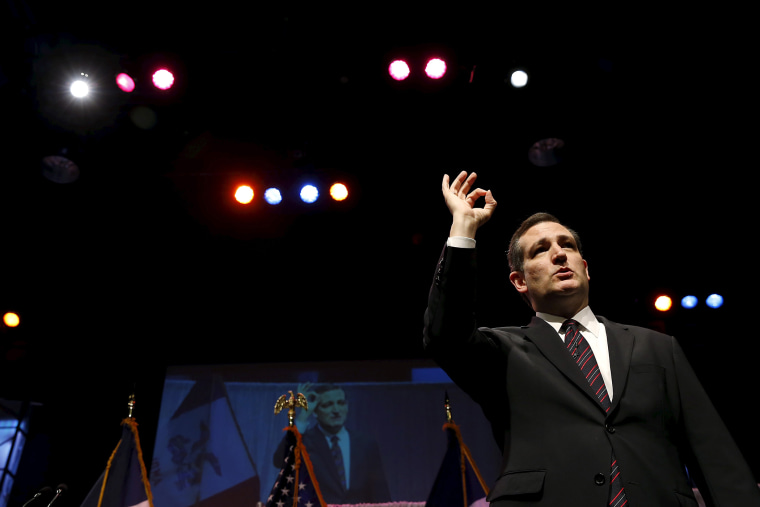Warning that the nation’s highest court had “crossed a line” with recent decisions in favor of the Affordable Care Act and same-sex marriage, Republican presidential candidate and Texas Sen. Ted Cruz said Wednesday he would “support every effort to bring power back to ‘We the people’” -- including proposals that would impose judicial term limits and retention elections.
Speaking at a hearing before the Senate Judiciary Subcommittee on Oversight, which he chairs, Cruz doubled down on his accusations of Supreme Court activism and called for the need to “rein in judicial tyranny.” Last month, shortly after the high court handed down a 5-4 decision that made marriage equality the law of the land, Cruz vowed to propose a constitutional amendment that would effectively upend Article III of the U.S. Constitution and subject justices to periodic retention elections.
“So long as justices on the court insist on behaving like politicians … they should not expect to be exempt from the authority of voters who disagree with their policy decisions."'
“So long as justices on the court insist on behaving like politicians … they should not expect to be exempt from the authority of voters who disagree with their policy decisions,” Cruz said, adding that he was sad to be criticizing the Supreme Court -- a body he once worked for and has long revered.
“I call for these reforms reluctantly and sadly as someone who has spent much of his life in and around the court,” Cruz said.
Though Cruz convened Wednesday’s hearing largely in response to the most recent Supreme Court term, he noted that it wasn’t the first time “we’ve seen the court’s imperial tendencies.” As evidence, he pointed to the 1857 Dred Scott decision, which affirmed slavery and denied citizenship to African Americans; the 1973 Roe decision, which protected a woman’s right to have an abortion; and the 1905 Lochner decision, which invalidated a maximum hour law and ushered in an era where federal courts routinely struck down labor regulations. On Lochner, Cruz said he agreed with the policy outcome, but that the ruling had “no basis in the Constitution.”
Cruz spent a good deal of time on the consequences of Roe, linking the decision to the current controversy surrounding Planned Parenthood. In a series of secret-camera videos, created and recently released by a group with deep ties to the anti-abortion movement, employees of the nonprofit group can be seen talking about reimbursement for providing fetal tissue to medical research institutions.
RELATED: Will Planned Parenthood’s allies blink?
“We are now witnessing the shameful results of the court forcing its own unlimited right of abortion onto the Constitution,” Cruz said. “Two undercover videos of Planned Parenthood show senior officials callously, heartlessly bargaining, haggling over the price of selling body parts of unborn children.”
On the recent King v. Burwell decision, which upheld federal subsidies for all eligible Americans who purchase health insurance under the Affordable Care Act, Cruz accused the justices of “putting on a partisan uniform, joining the team of the Obama administration, and rewriting Obamacare.”
Much of the hearing, however, centered on the recent case of Obergefell v. Hodges, which established a constitutional right to same-sex marriage. In fact, John Eastman, who serves as chairman of the board of the National Organization for Marriage (NOM) -- a group with the primary goal of limiting marriage to opposite-sex couples -- was one of three panelists called to testify before the subcommittee.
Eastman agreed with Cruz’s proposals on judicial term limits and retention elections, but added one more “check” to the judicial branch -- that states be given the ability to override “egregiously wrong decisions of the Supreme Court.” Cruz seemed interested in the idea, and asked for Eastman to elaborate.
“We are now witnessing the shameful results of the court forcing its own unlimited right of abortion onto the Constitution.”'
“The massive transfer of power from states to the federal government that came in the wake of the Civil War … unmoored the courts,” Eastman said. “A simple majority of the states ought to be able to override those kinds of decisions of the Supreme Court.”
The irony of such prescriptions was undoubtedly not lost on many of those watching Wednesday’s hearing. In order to correct what Cruz views as a series of decisions that have no basis in the U.S. Constitution, as well as what he considers to be an unconstitutional transgression by the justices into the realm of policy making, Cruz entertained several solutions -- such as judicial term limits, retention elections, and state or Congressional overrides of “egregiously wrong decisions” -- that would serve to dramatically alter the U.S. Constitution, not restore or strengthen it.
RELATED: Ted Cruz: 'Religious liberty' under attack
Democratic Sen. Chris Coons of Delaware, the ranking member on the subcommittee, seemed all too aware of that fact and attempted to counter the claim that the Supreme Court had turned into a political tool of the left. He pointed to the 2010 Citizens United decision, which blew the lid off campaign spending regulations, and the 2013 Shelby County decision, which gutted a key provision of the 1965 Voting Rights Act, as examples of recent rulings that disappointed many liberals in America.
Coons stressed: “We cannot decry judicial activism and create a constitutional crisis every time a big case comes out against us.”
